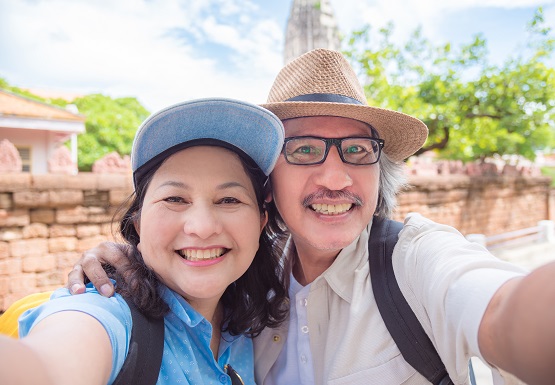
Vaccinations are a scientifically proven form of preventive medicine against a wide range of infections. Dr Charis Kum Jia Hui, Resident Physician at Mount Alvernia Hospital’s Health Screening Centre, explains the importance of vaccinations for the elderly.
HIGHLY RECOMMENDED
Given the likelihood of weakened immune systems and age-related chronic diseases, vaccinations against influenza and pneumococcal infections are highly recommended for the elderly. They are pneumococcal conjugate vaccine (PCV 13) and pneumococcal polysaccharide vaccine (PPSV 23). In addition to the elderly, those with asthma, chronic lung disease, diabetes, cardiovascular disease and chronic liver disease should also be vaccinated.
To prevent seasonal influenza, influenza jabs should be taken annually for those aged 65 years or older.
For adults who have no evidence of immunity and no history of having suffered from the diseases for which the vaccines apply, the following vaccinations are also recommended:
| Type | No. of doses | Interval between doses |
|---|---|---|
| MMR (Measles, Mumps, Rubella) | 2 | 4 weeks |
| Hepatitis B | 3 | 6 weeks |
| Varicella | 2 | 4 to 8 weeks |
PRECAUTIONS AND EXEMPTIONS
In general, anyone who has experienced a severe allergic reaction after a previous vaccination or allergies to specific vaccine components should not receive the vaccine.
Those who are severely immunocompromised should not receive live (active) vaccines such as the MMR or varicella vaccines.
The influenza vaccine should not be taken by elderly patients with immunocompromising conditions such as cancer, and chronic pulmonary conditions such as chronic bronchitis and chronic obstructive lung disease. Transplant patients should be excluded as well.
SIDE-EFFECTS AND RISKS
Vaccinations are given by an injection into the muscles or beneath the skin. Mild side-effects of vaccinations include redness, tenderness or swelling where the injection is given. Other side-effects include decreased appetite, fever, muscle aches, headaches and nausea.
The influenza vaccine has been associated with a slightly increased risk of developing Guillain-Barre Syndrome (GBS). This is a rare disorder in which the body’s immune system attacks your nerves. Symptoms include weakness and tingling in the arms or legs. However, the data on the association between GBS and seasonal flu vaccination are variable and inconsistent across flu seasons. If there is an increased risk of GBS following flu vaccination, it is small, around one to two additional cases per million doses of flu vaccine administered.
BEFORE TRAVELLING
Before travelling, the elderly should consult a doctor who will assess their risks and weigh them against the benefits of travellers’ vaccinations. This includes a consideration of the risk of disease, the benefits of vaccination, the individual’s underlying health, the cost of the vaccine and the risk of possible side-effects.
In general, all travellers regardless of age should get certain routine vaccinations before travelling anywhere in the world. These include vaccinations for Measles, Mumps, Rubella (MMR), Diphtheria, Tetanus, Pertussis and Polio.
In addition, selected vaccinations are recommended for travellers visiting specific countries, as follows.
| Hepatitis A | Hepatitis B | Influenza | JE* | Typhoid | Yellow Fever | Rabies | Meningo-coccal | |
|---|---|---|---|---|---|---|---|---|
| China | ✔ | ✔ | ✔ | ✔ | ✔ | |||
| India | ✔ | ✔ | ✔ | ✔ | ✔ | |||
| Vietnam | ✔ | ✔ | ✔ | ✔ | ✔ | |||
| Indonesia | ✔ | ✔ | ✔ | ✔ | ✔ | |||
| South America | ✔ | ✔ | ✔ | ✔ | ✔ | ✔ | ✔ | ✔ |
| Africa | ✔ | ✔ | ✔ | ✔ | ✔ | ✔ | ✔ | ✔ |
| Saudi Arabia | ✔ | ✔ | ✔ | ✔ | ✔ | ✔ |
* JE = Japanese Encephalitis
YOUR ONE-STOP VACCINATION DESTINATION
Vaccinations are available at the Emergency and 24-hour Clinic of Mount Alvernia Hospital.
If you are in your golden years, make sure that your quality of life is not tarnished by preventable diseases. Vaccinations can add vitality and peace of mind – and possibly even years.
AGE IS NO BARRIER TO THE EFFECTIVENESS OF FLU VACCINATIONS
Clinical trial results have shown that flu vaccinations can work as effectively in the active healthy elderly compared to the young. This was discovered through post-vaccination measurements of the levels of antibodies in their body fluids. The research findings also suggest that antibody responses in the elderly, induced by the influenza vaccinations, are not impaired by the frailty levels of the elderly subjects. These findings show that elderly adults, regardless of frailty level, should be recommended to receive seasonal influenza vaccinations to protect themselves.
The National Adult Immunisation Schedule (NAIS) issued by Singapore’s Ministry of Health (MOH) recommends influenza vaccinations for those aged 65 years and above.
SOURCES
https://www.gov.sg/resources/sgpc/media_releases/astar/press_
https://www.cdc.gov/flu/protect/vaccine/guillainbarre.htm
Article contributed by Dr Charis Kum, Resident Physician at Mount Alvernia Hospital’s Health Screening Centre. To learn more on vaccinations we offer, contact our 24-Hr Clinic and Emergency services at 6347 6210
This article is taken from our MyAlvernia Magazine Issue #37. Click here to read the issue on our website or on Magzter.